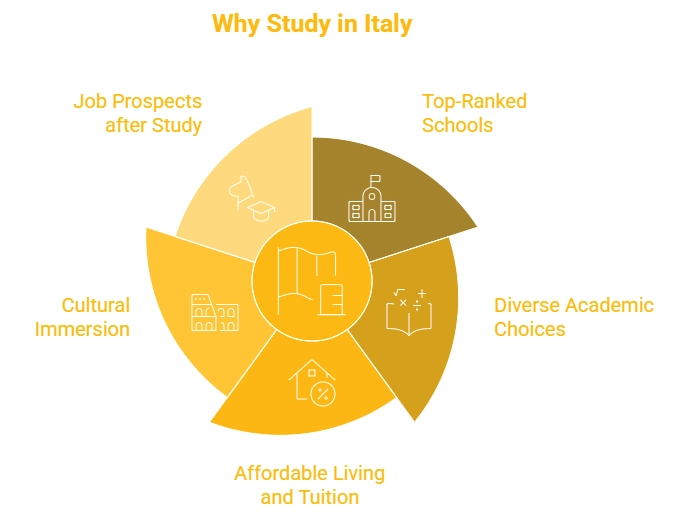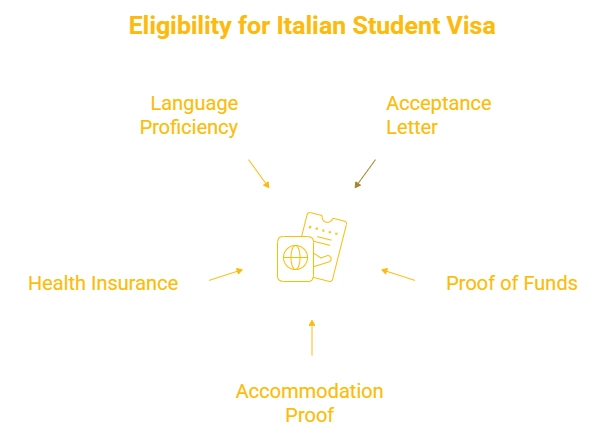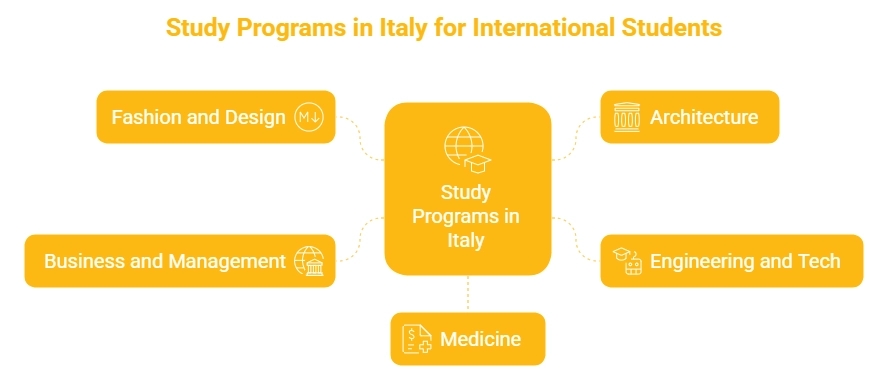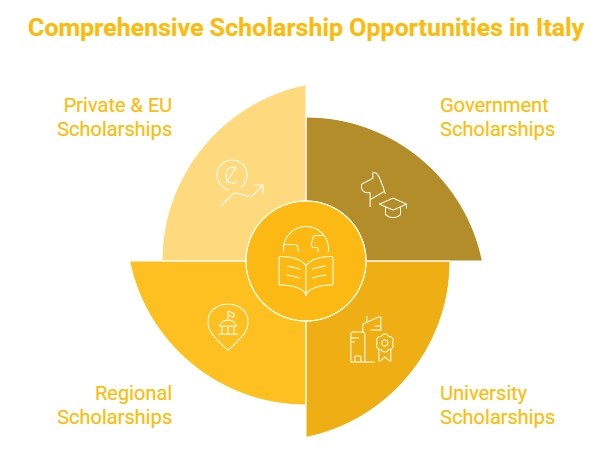Italy is quickly becoming a preferred destination for UK students seeking education abroad because of its rich art, history, and innovative environment. The country's universities are globally ranked, tuition is cheap, and there is a vibrant lifestyle, making it a compelling alternative to traditional study destinations like US or Australia. Italy has something for everyone, whether you are interested in Renaissance architecture, modern fashion, or strict academic studies.
Here are some main reasons why Italy is a great option for students from the UK:
1. Top-Ranked Schools
2. Diverse Academic Choices
3. Affordable Living and Tuition
4. Cultural Immersion
5. Job Prospects after Study

Students from the UK who want to study in Italy need a Type D student visa. To get this visa, you must meet the following criteria:

To apply for your student visa, be sure to gather the items on this checklist:
All documents must be translated to either Italian or English and be notarized, if needed.
Visa processing schedules change based on the time of year and how busy the consulate is. Here is what you should know:
Typical Processing: 15-30 working days
Peak Period (July-September): May take up to 90 days
Recommended Timeline to Apply: To prevent delays, apply a minimum of 3 months before your planned travel date.
You must schedule a meeting at the closest Italian consulate in the UK for an interview.
Italy’s universities combine academic excellence with historic prestige. Here are some of the best options for UK students:
| University | QS World Ranking | Location | Notable Programs |
| Politecnico di Milano | 98 | Milan | Engineering, Design, Architecture |
| Sapienza University of Rome | 128 | Rome | Medicine, Humanities, Sciences |
| University of Bologna | 138 | Bologna | Law, Philosophy, Political Science |
| University of Padua | 233 | Padua | Physics, Medicine, Psychology |
| University of Milan | 276 | Milan | Biotechnology, Economics |
| Politecnico di Torino | 242 | Turin | Engineering, IT, Urban Planning |
Italy offers wide range of programs that appeal to overseas students. Some common fields of study include:
Fashion and Design
Milan is a fashion center. Schools like Istituto Marangoni and Domus Academy offer cutting-edge programs in fashion design, styling, and luxury brand management.
Architecture
Italy's architectural past makes it a great place for future architects. Programs usually have visits to historic places and design projects.
Engineering and Tech
Politecnico di Milano and Politecnico di Torino are strong in engineering education. They offer programs in mechanical, civil, and computer engineering.
Business and Management
Schools such as Bocconi and Luiss Business School provide MBAs and master's programs in finance, marketing, and starting new businesses that are known globally.
Medicine
Italy has cheap medical degrees taught in English, which include rigorous training and work in clinics. Admission is competitive and requires passing the IMAT exam.

| Program Type | Public Universities | Private Universities |
| Undergraduate | €500 – €4,000/year | €6,000 – €20,000/year |
| Postgraduate | €1,000 – €5,000/year | €7,000 – €25,000/year |
| MBA | €8,000 – €12,000 | €20,000 – €38,000 |
Tuition fees at public universities are often income-based, meaning students from lower-income families pay less.
| Expense Category | Monthly Cost (€) |
| Accommodation | €300 – €700 |
| Food & Groceries | €150 – €250 |
| Transport | €25 – €45 |
| Utilities & Internet | €50 – €100 |
| Leisure & Personal | €50 – €100 |
Total monthly living costs range from €700 to €1,200 depending on the city and lifestyle.
Italy provides many scholarships for international students to help with their finances:
Government Scholarships:
The Italian government offers scholarships to foreign students in master’s or PhD programs, which include a monthly allowance and cover tuition.
University Scholarships:
Regional Scholarships:
Private& EU Scholarships:

To assist UK students with their visa applications, here is a guide:
Step 1: Get an acceptance letter from your selected university.
Step 2: Collect all necessary documents, such as financial statements, health insurance info, and housing details.
Step 3: Schedule a visa interview at the Italian consulate in London, Manchester, or Edinburgh.
Step 4: Submit your documents and attend interviews about your academic plans.
Step 5: Follow your application's progress online or through email.
Step 6: After approval, get your visa and prepare to travel.
Step 7: Within 8 days of arrival in Italy, register at the local police station.
Job-Seeking Visa: Graduates can stay for up to 12 months to find employment.
Work Permit: Convert your student permit to a work permit once you have a job offer.